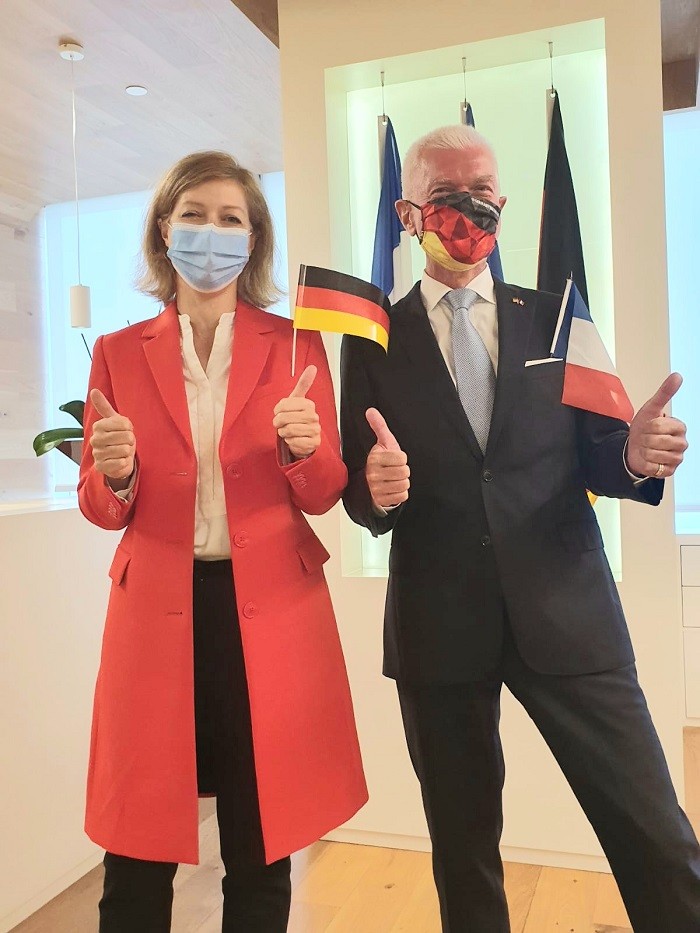The German and French embassies praised Kuwait’s multilateral participation, as a tradition that unites the three countries on the international stage.
The two embassies released a statement on the anniversary of the Franco-German day that today January 22, 2021 marks the 58th anniversary of the Elysée Treaty, signed by General de Gaulle and Chancellor Adenauer. This treaty sealed reconciliation and lasting peace between our two nations. It brought to an end several episodes of deadly conflicts and created a lasting friendship between our two countries benefiting the entire European continent.
The Élysée Treaty ushered in an era of unprecedented cooperation between our two countries. From 1950, France and Germany, with four partners, laid the foundations of what would become the European Union. France and Germany have played a driving role by giving impetus to the major advances in European construction: the Single European Act, the Maastricht Treaty, the Euro, the Schengen area, which have enabled the emergence of ‘a single market of 530 million inhabitants, the largest trading power in the world, but above all a single political unit of peace and prosperity.
Internationally, Franco-German “model cooperation” through a converging vision of priorities, in Europe and internationally.
It is also reflected in the co-location of our diplomatic holdings by virtue of a framework agreement signed during the Franco-German Council of Ministers of October 12, 2006. It is in Kuwait that this idea and this reality took hold for the first time form, with since 2016 Embassies of France and Germany sharing the same building. Since then, 7 other joint settlements have emerged around the world, following the successful example we have experienced here. Our two countries have always considered that they bore a special responsibility to continue building Europe, especially in times of crisis, as the convergence of our countries remains a decisive factor for the functioning of Europe.
Sovereignty does not mean turning inward, and our two countries are more active than ever on the international scene to preserve the conditions for peace and act in favor of the climate and environmental emergency. In April 2019, the French and German Foreign Ministers thus launched the “Alliance for Multilateralism” which is an informal alliance of countries convinced that a multilateral order based on respect for international law is the only reliable guarantee for international stability and peace and that the challenges we face can only be resolved through cooperation.
A conviction that our two countries share with Kuwait, whose multilateral engagement is a tradition that we salute. This Alliance aims to bring together partners of goodwill capable of speaking and taking action. We are confident that the transition in the United States will reinforce this dynamic. On environmental issues, Europe has set itself very ambitious objectives: carbon neutrality in 2050, a 55% reduction in CO2 emissions before 2030 compared to the levels observed in 1990. We think it is an absolute necessity to preserve living conditions on our planet and the future of our children.
On both climate and biodiversity, 2021 will be crucial, with many deadlines, such as the One Planet Summit (which was held on January 11 in Paris), the IUCN (International Union for nature conservation) organized by France, the COP26 to be held in Glasgow in November 2021, the Biodiversity COP in China and the COP dedicated to the issue of desertification. Each country will have to display its new ambitions.
The Chinese president has already expressed his ambition to reduce carbon emissions and President Joe Biden has returned to the Paris Agreement. We therefore hope for a new dynamic, which is essential to respond to the urgency of the situation. Since it was created, the European Union has changed drastically, in size, composition and organization. Europe is changing at the same time as the world is changing and it is too often forgotten that the EU is the great story of successful regional integration. The Union made it possible to achieve the plan carried by the “founding fathers” and more generally by those who wished to see the achievement of an area of peace, security, democracy, the rule of law, culture, economic prosperity, social justice, innovation.
Europe is all this and above all it is a hope and a common future. Our common message today is that of hope. Our national and European institutions are hard at work to face the crisis and it is only together and in solidarity that we will succeed in creating the conditions for a return to normal life. Here in Kuwait we are mobilized in this direction with you.

